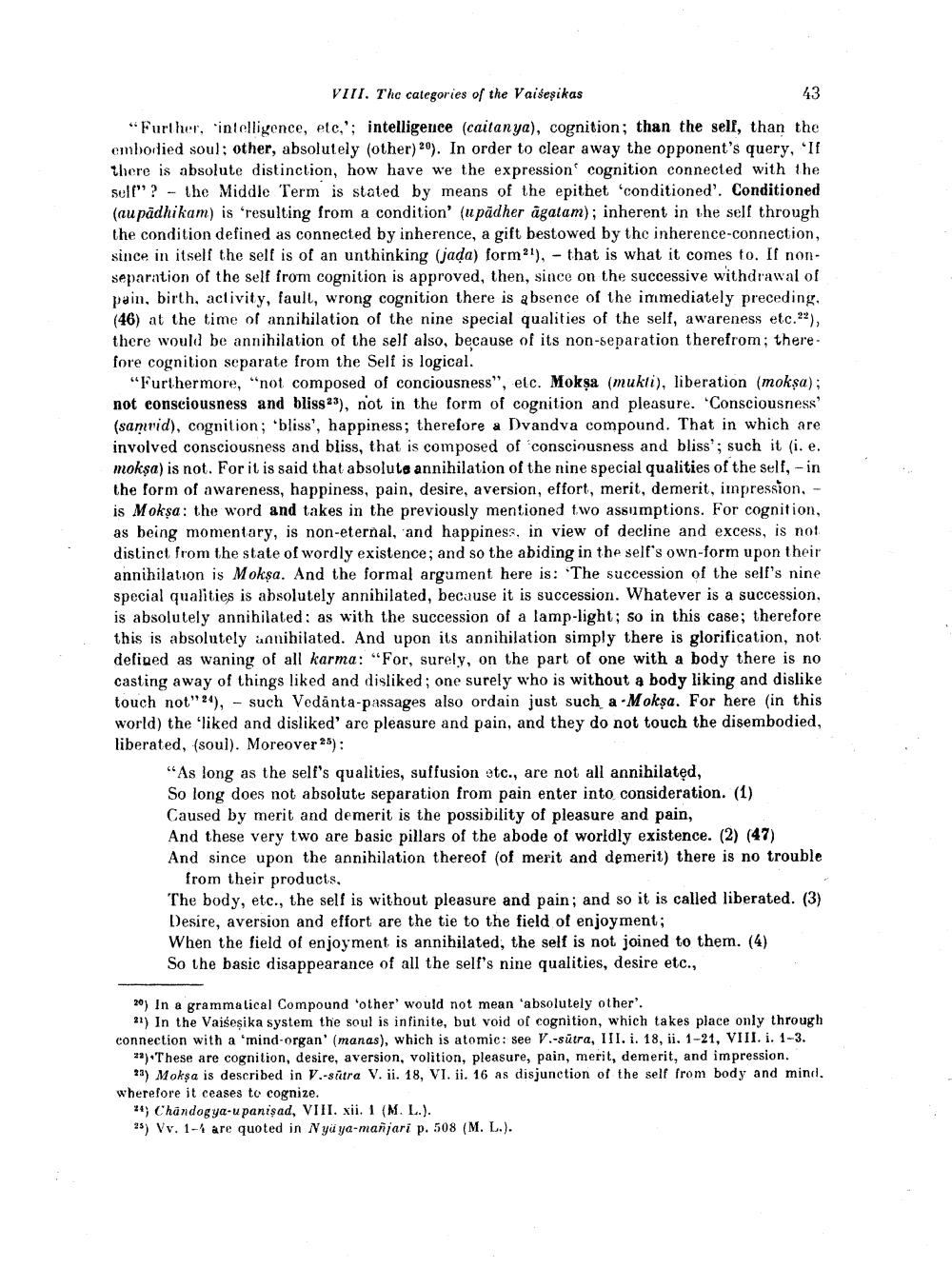________________
VIII. The categories of the Vaiseșikas "Further, intelligence, etc,'; intelligence (caitanya), cognition; than the self, than the emborlied soul; other, absolutely (other) 20). In order to clear away the opponent's query, 'If there is absolute distinction, how have we the expression cognition connected with the self"? - the Middle Term is stated by means of the epithet "conditioned'. Conditioned (au pādhikam) is ‘resulting from a condition' (upādher ágatam); inherent in the self through the condition defined as connected by inherence, a gift bestowed by the inherence-connection, since in itself the sell is of an unthinking jada) forma), - that is what it comes to. If nonseparation of the self from cognition is approved, then, since on the successive withdrawal of pain, birth, activity, fault, wrong cognition there is absence of the immediately preceding. (46) at the time of annihilation of the nine special qualities of the self, awareness etc.), there would be annihilation of the self also, because of its non-separation therefrom; there. fore cognition separate from the Self is logical.
"Furthermore, "not composed of conciousness", etc. Moksa (mukli), liberation (mokşa); not consciousness and bliss23), not in the form of cognition and pleasure. 'Consciousness (samrid), cognition; "bliss', happiness; therefore a Dvandva compound. That in which are involved consciousness and bliss, that is composed of consciousness and bliss"; such it (i.e. moksa) is not. For it is said that absolute annihilation of the nine special qualities of the self, -in the form of awareness, happiness, pain, desire, aversion, effort, merit, demerit, impression. - is Mokşa: the word and takes in the previously mentioned two assumptions. For cognition, as being momentary, is non-eternal, and happiness, in view of decline and excess, is not distinct from the state of wordly existence, and so the abiding in the self's own-form upon their annihilation is Moksa. And the formal argument here is: "The succession of the self's nine special qualities is absolutely annihilated, because it is succession. Whatever is a succession, is absolutely annihilated: as with the succession of a lamp-light; so in this case; therefore this is absolutely annihilated. And upon its annihilation simply there is glorification, not deliged as waning of all karma: "For, surely, on the part of one with a body there is no casting away of things liked and disliked; one surely who is without a body liking and dislike touch not"24), - such Vedanta-passages also ordain just such a Mokşa. For here in this world) the 'liked and disliked' are pleasure and pain, and they do not touch the disembodied, liberated, (soul). Moreover 25):
"As long as the self's qualities, suffusion etc., are not all annihilated, So long does not absolute separation from pain enter into consideration. (1) Caused by merit and demerit is the possibility of pleasure and pain, And these very two are basic pillars of the abode of worldly existence. (2) (47) And since upon the annihilation thereof (of merit and demerit) there is no trouble
from their products, The body, etc., the self is without pleasure and pain; and so it is called liberated. (3) Desire, aversion and effort are the tie to the field of enjoyment; When the field of enjoyment is annihilated, the self is not joined to them. (4) So the basic disappearance of all the self's nine qualities, desire etc.,
20) In a grammatical Compound 'other' would not mean 'absolutely other'.
21) In the Vaiseșika system the soul is infinite, but void of cognition, which takes place only through connection with a 'mind organ' (manas), which is atomic: see V.-sutra, III. i. 18, ii. 1-21, VIII. i. 1-3.
22) These are cognition, desire, aversion, volition, pleasure, pain, merit, demerit, and impression.
23) Moksa is described in V.-sutra V. ii. 18, VI. ii. 16 as disjunction of the self from body and minci. wherefore it ceases to cognize.
24) Chandog ya-u panişad, VIII. xii. 1 (M. L.). 25) Vv. 1-1 are quoted in N yü ya-manjari p. 508 (M. L.).




